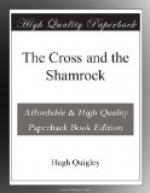“Wal, wal, if she had trusted in the Lord, and knew the word of God, he would not have deserted her as he has,” hypocritically answered the official.
“I beg your pardon, sir, don’t judge rashly. She was not deserted by God, but died content and happy, after all the rites of her holy religion were administered to her,” was the prompt reply.
“You think so; but I want to know how she could love God without the Bible; and you Roman Catholics are not allowed its use.”
“God help those that can’t read so,” said Mrs. Doherty. “There is no chance for me or my old man, for neither of us can read it; but not so Mrs. O’Clery, God be good to her. She had her Bible, and many more good books.”
“Yes, sir,” said Paul, joining in the dialogue. “We have always had the true Catholic Bible, and mother always read it on her knees.”
“Wal, my good lad, you are pooty smart; and now get you ready, with the rest of you little critters, and come on the sleigh I will send for you. Let’s see how many of you there are. One, two, three, four—a great lot of ye. As I was saying, be ready to come up to the county house till I can get some folks to take ye in to keep till ye are of age.”
“The priest, sir,” said Paul, “promised to call to-day; and as he already has left us a good sum of money, I know the good man will provide for us till he writes to my uncle, who would be very sorry to hear of our going to the poorhouse or the county house, though it may be a better place.”
“My young lad, you will be provided for by law, and don’t fail to be ready by ten o’clock,” said the official, sternly, as he left the room.
In a few hours after, the body of the widow O’Clery was deposited in a rough, unplaned pine coffin, and placed on board a two-horse, open sleigh. The four orphans were stowed around in the same vehicle, and, in care of a constable, the cortege drove off at full speed to the cemetery. By half past eleven, the remains of the widow were consigned to their kindred earth, the few lumps of hard frozen clay on the surface her only monument—the sobs, sighs, and prayers of her own dear children the only requiem uttered over her lowly and soon-to-be-forgotten tomb. “Blessed are the dead who die in the Lord from henceforth now, saith the Spirit, that they may rest from their labors.” (Apoc. xiv. 13.)
CHAPTER IV.
THE POORHOUSE.
When Father O’Shane left for the village of B——, in Vermont, to administer the rites of Christian unction to a departing soul, the roads were very hard to travel, and his progress, in company with his faithful guide, was tedious and slow in the extreme. The call was to a sick woman named Finmore, who was in the last stage of consumption, and who had often, during her illness, expressed a desire that she should be attended by a priest before she would die. Her husband did not oppose her




